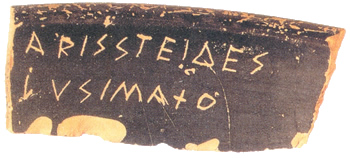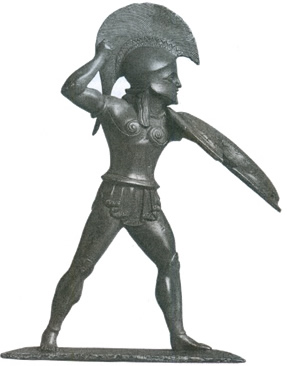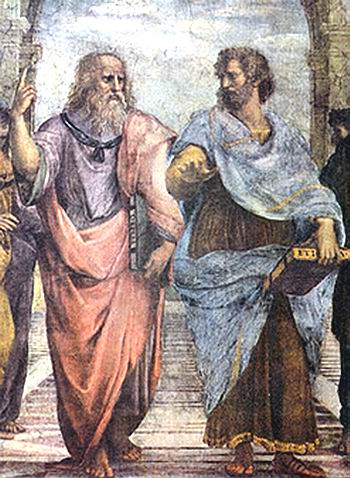Socrates - Appendix - 3

Fragment of pottery on which an Athenian citizen could scratch the name of the man he was voting to ostracize, that is to say, to send into exile.
Appendix III
A Detailed Chronology
|
490 BC |
— The 1st Persian war, the Persian army led by Darius is defeated by the Athenians in the battle of Marathon. |
|
480 BC |
— The 2nd Persian war, the Persian army led by Xerxes is defeated in the Bay of Salamis by the Athenian forces. |
|
469 BC |
— Birth of Socrates. |
|
461 BC |
— Pericles rises to prominence as a leading statesman of Athens. |
|
463 BC |
— Cimon, leader of the oligarchs, is ostracized. Ephialtes, leader of the Democratic Party is assassinated. Pericles replaces him and becomes Commander |
|
in-chief of Athens. |
|
|
449 BC |
— Acropolis is rebuilt and construction of the Parthenon begins. |
|
445 BC |
— Aristophanes is born. "Thirty Year Peace" is signed between Sparta and Athens. |
|
432 BC |
— Socrates participates in the battle of Potidaea in which he saves the life of Alcibiades, a former student who would later become known for his deceit and treason. |
|
431 BC |
— Peloponnesian War begins between Sparta and Athens. Socrates serves as a hoplite (a heavy infantryman armed with a shield, a spear, and a sword), winning praise for his bravery. |
|
430 BC |
— A terrifying plague begins in Athens that lasts for about four years and kills over one-third of the population of Athens. Trial of Pericles takes place. He is blamed for the war and its resulting misery and is deposed. |
|
429 BC |
— Pericles is reinstated, but soon dies from the plague. The political structure of Athens is in ruin. The plague seems also to have had a devastating effect on morals. Cleon becomes leader of the Democratic Party. |
|
427 BC |
— Birth of Plato. |
|
423 BC |
— Aristophanes's play Clouds, satirizing Socrates, is performed for the first time. |
|
421 BC |
— Peace of Nicias is signed between Sparta and Athens proposing fifty years of peace. |
|
420 BC |
— Alcibiades is named commander-in-chief. |
|
416 BC |
— Athenian forces attack the island of Melos. Athenian forces kill all the men, enslave the women and children, and open the island to settlement by Athenians. |
|
415 BC |
— Alcibiades leads an expedition to subjugate Sicily. When he is recalled to Athens to stand trial for the mutilation of the statues of Hermes, |

|
he escapes to Sparta and proposes to help them defeat Athens. |
|
|
414 BC |
— The Sicilian expedition of Athens ends in disaster, with the attacking Athenian fleet destroyed. Aristophanes's play Birds is performed for the first time. In the play, Aristophanes refers to pro-Spartan youth as "socratified." |
|
413 BC |
— Sparta, supported by Persia, declares war on Athens. Sparta claims the Athenians had repeatedly violated the Peace of Nicias. |
|
411 BC |
— Alcibiades overthrows democracy in Athens and the dictatorship of the Four Hundred takes over. |
|
410 BC |
— After four months in power, the dictatorship of the Four Hundred is deposed and replaced with a democratic regime: the Council of Five Thousand. |
|
406 BC |
— The newly rebuilt Athenian fleet defeats Spartan forces off the island of Lesbos, but the crews of twenty five ships drown in a storm. Athenians prosecute and condemn to death the generals thought responsible for the disaster in a single trial. Socrates alone opposes the decision to put the convicted generals to death as he considered it unconstitutional, but they are executed anyway. Alcibiades is exiled. |
|
404 BC |
— Athens falls to Sparta; the harsh, oligarchic Rule of the Thirty Tyrants led by Critias, a former pupil of Socrates, is imposed. Socrates and four others are ordered to arrest Leon of Salamis, a democrat so that his property could be seized and he could be executed. Socrates refuses to collaborate with the Oligarchs. Leon is arrested and put to death. |

The School of Athens (detail): Plato andAristotle, fresco by Raphael (1483 - 1520), Rome
|
403 BC |
— Democracy is restored in a violent overthrow of the Rule of the Thirty. The Amnesty of Eucleides is passed completely revising Athenian law and pardoning all prior offenses. All legal accusations would now be based on newly codified law. |
|
399 BC |
— Socrates is charged with "corrupting the youth of Athens" and "impiety". He is convicted on a 280-220 by a 500-person jury of freemen, and then sentenced to death by hemlock poisoning by a larger margin. |
|
386 BC |
— Establishment of Plato's School Academy' |
|
367 BC |
— Aristotle, at age 17, enters Plato's Academy and becomes his most illustrious student. |
|
347 BC |
—Death of Plato. |
|
345 BC |
— The earliest recorded non-Platonic and non-Xenophonic reference to the trial of Socrates is made by Aeschines, an Athenian statesman and orator, in a prosecution. In it, he says to the jury "....put Socrates, the sophist, to death...because he was shown to have been the teacher of Critias, one of the Thirty who put down democracy." |
|
529 AD |
— Emperor Justinian closes the Platonic academy and other schools of philosophy in Athens, ending a twelve hundred year period of relatively free thought. |
*
Related Books
- Alexander the Great
- Arguments for The Existence of God
- But it is done
- Catherine The Great
- Danton
- Episodes from Raghuvamsham of Kalidasa
- Gods and The World
- Homer and The Iliad - Sri Aurobindo and Ilion
- Indian Institute of Teacher Education
- Joan of Arc
- Lenin
- Leonardo Da Vinci
- Lincoln Idealist and Pragmatist
- Marie Sklodowska Curie
- Mystery and Excellence on The Human Body
- Nachiketas
- Nala and Damayanti
- Napoleon
- Parvati's Tapasya
- Science and Spirituality
- Socrates
- Sri Krishna in Brindavan
- Sri Rama
- Svapnavasavadattam
- Taittiriya Upanishad
- The Aim of Life
- The Crucifixion
- The Good Teacher and The Good Pupil
- The Power of Love
- The Siege of Troy
- Uniting Men - Jean Monnet